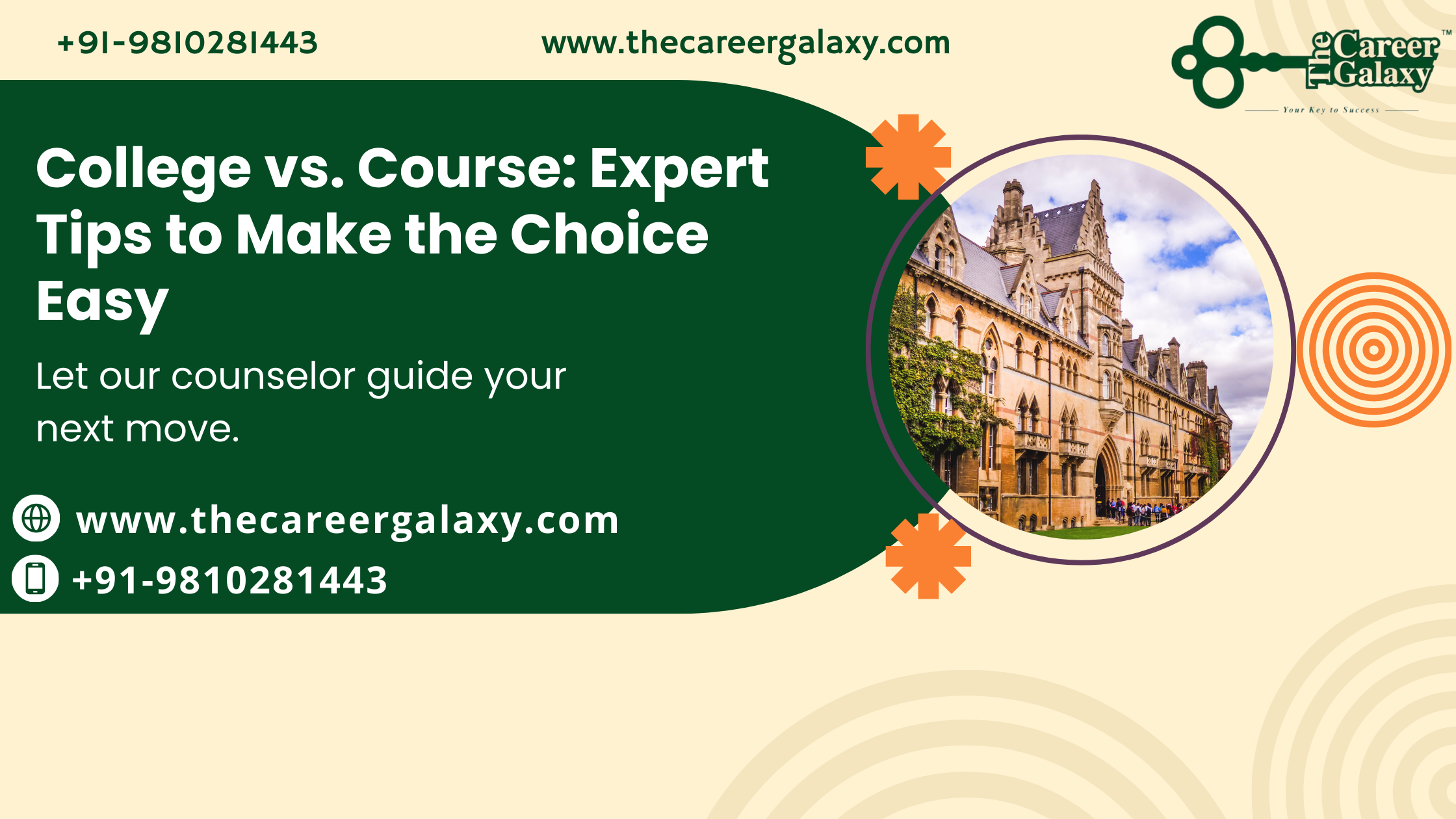
College vs. Course: Expert Tips to Make the Choice Easy
College vs. Course: Expert Tips to Make the Choice Easy
Choosing the right educational path after high school can feel overwhelming. Should you enroll in a college degree program or take up a specialized course? Both paths can lead to meaningful careers, but each comes with its own benefits and challenges.
This blog will break down the key differences between pursuing a degree and enrolling in a course. We’ll provide insights, expert tips, and real-life examples to help you make a choice that aligns perfectly with your goals.
What Does a College Education Offer?
A college education involves pursuing a degree through structured programs at a university or institution. It typically spans 3-4 years, equipping students with academic knowledge, critical thinking skills, and a well-rounded education.
Benefits of Pursuing a College Degree
- Comprehensive Learning: A degree program provides an in-depth understanding of various subjects, shaping a broad knowledge base.
- Career Opportunities: Many careers, such as medicine, engineering, or law, require formal degrees.
- Networking: College introduces students to professors, peers, and alumni who can guide and support them in building their career.
- Personal Development: College life fosters independence, time management, and problem-solving skills.
Drawbacks of a College Education
- Higher Cost: Tuition and other expenses can make college a significant financial investment.
- Longer Commitment: Degree programs often require a commitment of 3-4 years or more.
- Structured Curriculum: Some students may find the rigidity of fixed syllabi limiting.
What is a Course?
A “course” refers to specialized training in a specific skill or field. These range from short-term online courses to full certification or diploma programs. Examples include taking an online course in graphic design, studying a professional course in AI, or joining a certification program for digital marketing.
Benefits of Enrolling in a Course
- Focused Learning: Courses are designed to teach specific, practical skills with less theoretical knowledge.
- Flexibility: Many courses are available online or part-time, allowing learners to balance them with other commitments.
- Cost-Effective: They are generally more affordable than full-fledged degree programs.
- Short-Term Completion: You can complete a short-term course or diploma course in a matter of weeks or months.
Drawbacks of a Course
- Limited Scope: Courses often focus exclusively on one skill or field, providing less exposure.
- Credential Limitations: A course certificate may not hold as much value compared to a college degree in certain professions.
- Narrow Career Pathways: A course may limit your options to specific roles or industries.
Key Differences Between College and Courses
| Aspect | College Education | Courses |
|---|---|---|
| Duration | 3-4 years or more | Short-term (weeks/months) |
| Cost | Higher investment | More cost-effective |
| Focus | Broad academic learning | Skill-specific learning |
| Career Scope | Opens doors to various professions | Prepares for niche roles |
| Flexibility | Fixed schedule, less flexibility | Can be part-time or online |
| Credential Value | Globally recognized degree | Certification/diploma |
What Factors Should You Consider?
1. Personal Interests
Ask yourself, “What excites me the most?” If you enjoy broad academic topics, pursuing a degree might be ideal. If hands-on skills excite you, studying a professional course may be the right fit.
2. Career Goals
Some careers, like medicine or engineering, strictly require a degree. Others, like web development, may favor job-ready certifications. Identify the qualifications your desired industry values most.
3. Financial Implications
Factor in tuition fees, the cost of learning materials, and additional expenses. A college education often costs more, while taking a short-term course offers a more affordable alternative.
4. Time Commitment
Are you prepared to commit several years to education? If not, enrolling in a course may be a quicker way to build skills and enter the workforce.
Confused?
College vs Course Which Options is Best
Expert Tips to Make an Informed Choice
- Research Job Requirements
Look up the qualifications required for your dream job. This will help clarify whether pursuing graduation or joining a certification course aligns better.
- Take Assessments
Use career counseling tools to assess your strengths and interests. Self-awareness is vital when choosing an educational path.
- Speak to Professionals
Connect with individuals in your desired career field. Their insights can help you decide whether pursuing higher education or taking a course is the better route.
- Experiment with Online Learning
If you’re unsure, taking an online course in your area of interest can help you determine whether it’s a good fit for you.
Real-Life Examples
Success Through College Education
Priya always dreamed of becoming a doctor. She spent five years pursuing her degree at medical school and is now excelling in her career as a pediatrician. For her, college was the only route to achieving her ambition.
Success Through Courses
Rahul wasn’t sure about committing to a long-term degree. Instead, he studied a professional course in digital marketing and after six months landed his first job. Today, as a successful marketing consultant, he continues taking short-term courses to refine his skills.
Choose What’s Right for You
Whether you decide to pursue graduation or start studying a course, the choice should align with your passions and career aspirations. Remember, no path is inherently better than the other; it depends on your individual goals and circumstances.
If you’re still unsure, The Career Galaxy can guide you further. Our experts provide tailored advice to help you make informed decisions about your future. Contact us today to build a career you love.
